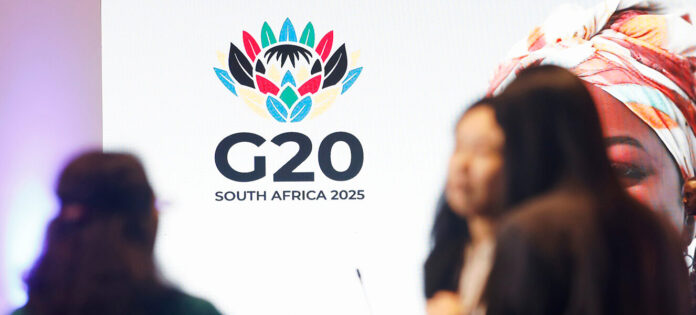The two-day G20 summit, which concludes today, serves as a crucial test of South Africa’s ability to transform its historic G20 presidency into meaningful influence on the global development agenda, particularly to advance the interests of developing nations across Africa. The absence of key world leaders – including the presidents of the US, China and Russia – undeniably shapes the diplomatic environment and complicates South Africa’s unprecedented role as the first African country to hold the G20 presidency.
Representatives attending in place of absent heads of state have limited authority, which means that despite South Africa’s power to set the agenda and champion priorities, its influence over critical Africa-related negotiations may be less immediate and impactful.
The G20’s informal, consensus-driven nature further limits this influence, as decisions are not legally binding.
SA must therefore rely on diplomacy, coalition-building, and aligning interests with other developing and major economies to push Africa’s development goals.
Geopolitical complexities add another layer of challenge. The absence or boycott by major players such as the US weakens the presidency’s effectiveness, even as South Africa’s symbolic breakthrough as the first African host raises the profile of Africa’s agenda.
Yet, these limitations also create a strategic opening. By focusing the agenda on its theme of “Solidarity, Equality, Sustainability,” South Africa can amplify African voices, highlight the continent’s development challenges and opportunities, and promote debt reform and South-South cooperation, gaining support from emerging economies and the Global South.
The absence of some global powers arguably enhances South Africa’s role as a convening voice for developing economies. With the US and Russia not fully present, the Global South has greater space to shape discussion and decision-making around the multiple crises the world faces – climate change, economic inequality, technological innovation and geopolitical stability.
Leading preparatory Sherpa and Finance track meetings, South Africa is positioned to influence discussions and build consensus on policies that benefit Africa, even though final decisions rest with all G20 leaders. Its seasoned diplomacy and the G20 platform empower it to mobilise resources, raise awareness, and foster partnerships that amplify Africa’s interests.
While the presidency’s influence is primarily political rather than executive, it can drive political will and commitments that translate over time into real benefits for Africa’s economic growth.
Key to this strategic leverage is the recent release of the World Inequality Report, commissioned by President Cyril Ramaphosa. The comprehensive, data-driven report diagnoses global inequalities and recommends practical reforms, including the formation of an International Panel on Inequality, modelled on the Intergovernmental Panel on Climate Change, to provide ongoing assessments and guide policy.
This signals South Africa’s innovative leadership and commitment to a global governance framework rooted in equity and sustainability.
The report’s focus on economic and social disparities aligns seamlessly with South Africa’s broader G20 agenda of inclusive growth, industrial transformation, debt sustainability, technological innovation, and food security – vital pillars for Africa’s development. Embedded within a multilateral framework, these initiatives demonstrate a deep understanding of Africa’s realities and a pragmatic road to systemic change.
The report stands as both a symbol and a practical tool for South Africa’s ambition to assert stronger influence, grounded in rigorous evidence for advocacy and coalition-building.
Despite the absence of some global heavyweights, South Africa’s thorough preparation and ability to marshal support from other Global South countries place it well to maximise the summit’s potential. The event thus becomes more than an elite meeting – it serves as a platform for Africa to assert its voice, highlight its challenges, and secure a more inclusive and just global order.
In essence, the G20 2025 summit is poised to be a defining moment, revealing how effectively South Africa can convert symbolic leadership into substantive influence. The World Inequality Report, blending scholarly rigour with practical policy innovation to champion developing nations amid shifting global power dynamics, illustrates that SA is on a promising path.
The summit’s outcomes will depend largely on South Africa’s success in turning visions of equity and development into tangible progress, resonating far beyond the summit itself. This moment is pivotal not only for us but all of Africa and other developing regions striving for a fairer share in the global economy.
• Lekota is a veteran journalist



